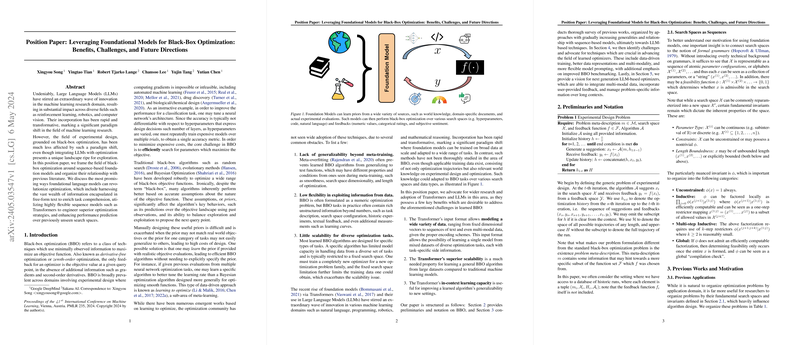Leveraging LLMs in Black-Box Optimization
Understanding Black-Box Optimization (BBO)
Black-box optimization (BBO) is a cornerstone technique in fields such as automated machine learning and drug discovery, where the goal is to optimize functions without an explicit understanding of their internal workings. These functions are opaque and provide outputs based solely on input values without revealing any internal computations. This optimization mainly relies on trial and error to find the best parameters.
Typically, BBO uses methods like random search or Bayesian optimization, which operate under constraints of not having derivative information and rely heavily on the overall quality of the selected priors (assumptions about function behavior). However, generating effective priors manually is challenging and often does not generalize across different tasks, adding layers of complexity and inefficiency.
Enter LLMs
LLMs, particularly those built on the Transformer architecture, have revolutionized several domains by their ability to learn effectively from vast amounts of data. These models, including popular ones like GPT (Generative Pre-trained Transformer), are now being explored for their potential in optimizing black-box functions.
LLMs can be trained across diverse datasets, capturing nuanced patterns and dependencies which can then be utilized to optimize a function efficiently. The paper explains potential benefits of LLMs, highlighting their adaptability to different data forms, scalability due to their architecture, and the ability to leverage pre-learned knowledge to generalize to new optimization tasks more effectively.
Benefits of Integrating LLMs with BBO
- Information Utilization: LLMs can process extensive and varied forms of data including free-form text, structured data, and even spoken language, which enriches the optimization process beyond numeric metrics.
- Scalability and Flexibility: Due to their architecture, LLMs can handle large-scale optimization tasks and adapt swiftly to new, unseen tasks using learned knowledge.
- Contextual Learning: LLMs can maintain and utilize historical context better, which is crucial for efficient optimization over successive iterations.
Challenges and Future Directions
While the integration of LLMs in BBO seems promising, it also presents unique challenges:
- Generalization across Tasks: LLM-based optimizers need to perform well across varying tasks with minimal task-specific fine-tuning.
- Data Representation: Effective strategies are needed for representing diverse optimization problems in a manner that LLMs can process efficiently.
- Complexity of Integration: Balancing exploration (trying new things) and exploitation (using known information) in optimization, adapting models to specific user needs, and ensuring performance across varied data types and structures.
Looking ahead, the paper suggests focusing research on:
- Developing methods for handling longer context lengths in optimization tasks.
- Integrating multimodal data more effectively to enrich the input space for LLMs.
- Exploring the development of specialized LLMs or systems of models that cater to specific aspects of optimization tasks.
Implications for AI Research
The potential to leverage LLMs in black-box optimization opens up a broad avenue for interdisciplinary research linking language processing capabilities with traditional optimization problems. This could not only enhance the efficiency and effectiveness of BBO but also pave the way for new forms of automated learning systems that can learn and adapt from a broader range of experiences and data types, pushing the envelope of what current AI systems can achieve.
